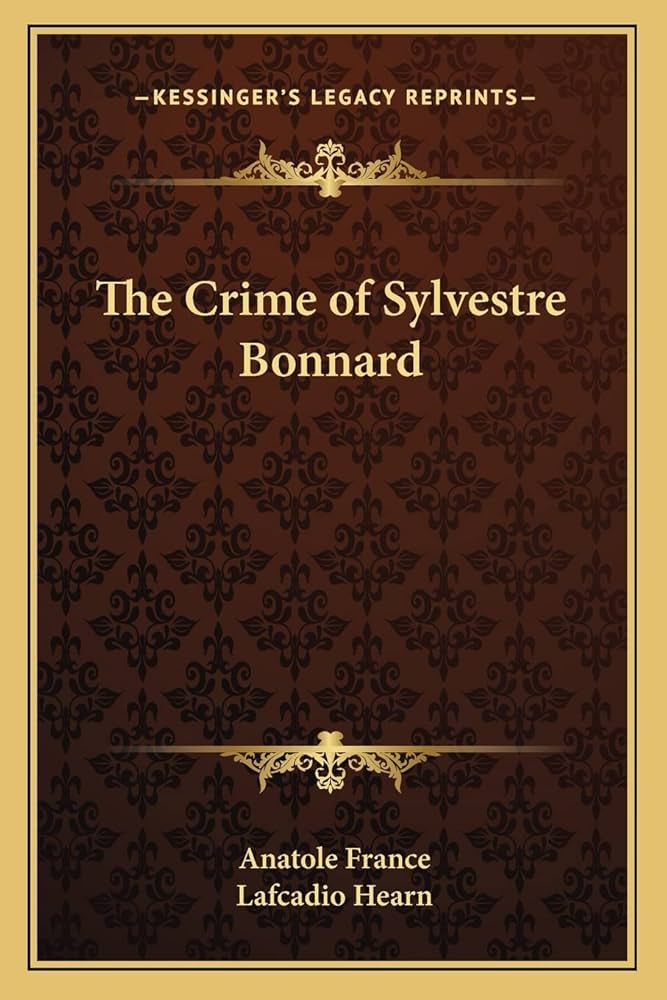Chapter IV — The Crime of Sylvestre Bonnard
byChapter IV marked a turning point not just in a diary, but in a life long defined by quiet rituals and solitary pursuits. The once silent haven of manuscripts had grown vibrant, filled with the laughter and presence of two young hearts discovering love. Jeanne and Gelis, with their blooming affection, brought warmth into corners of the house where only the rustling of old paper once lived. The shift was not sudden but unmistakable, like the slow stretch of sunlight returning after a long winter. Each morning, as I worked with the catalog of books for the final time, the task no longer felt lonely—it was filled with anticipation. What once was preservation had now become preparation for something greater, something beyond the self. Letting go of these volumes, each bearing part of my soul, was no longer a burden, but a privilege, because they would nourish lives and futures I had come to cherish more than my own past.
The transition of Jeanne into a poised and independent woman unfolded before me as gracefully as the changing seasons. Her fear, once visible in the way she held her hands or lowered her gaze, had melted into quiet determination. Watching her with Gelis, whose calm strength gave her roots, reminded me that time and kindness grow courage where once there was only survival. I no longer saw myself as a rescuer, but as a witness to her rebirth. Their love was not loud or dramatic, but deep and certain—built on respect, shared dreams, and an earnest belief in each other. In those simple, stolen glances between them, I recognized the very things I had read about but never lived. Their tenderness became the most honest book I had ever encountered, and one I was grateful to help write, if only through presence and support. My world, once lined only by shelves, had found new dimensions in their unfolding story.
Curating Jeanne’s dowry became a process steeped in symbolism. Each volume I selected was chosen not just for rarity or worth, but for the spirit it carried—truths, myths, and insights meant to live again through their readers. It was no longer about guarding knowledge but gifting it, planting seeds of reflection and wonder in the soil of a shared life. Letting go of these books wasn’t forgetting them—it was trusting that their pages would be turned with the same reverence I once had. Some of the bindings trembled slightly in my hands as if reluctant to part from me, yet I knew they would be better served where they could inspire love and learning. There was a silent grace in the act of release, a peace I hadn’t expected. Perhaps this was the final lesson the library had to teach: that knowledge kept to oneself dies, but shared, it multiplies in meaning. Jeanne’s hands, once hesitant, now accepted these gifts with dignity and joy.
The celebration of their union brought with it emotions I had long since set aside. My identity as a scholar faded behind the proud role of a father figure. I had not fathered Jeanne, but I had nurtured her spirit, and in doing so, I had discovered a softer, humbler version of myself. The part of me that once resisted sentiment now found comfort in her happiness, knowing I had been part of something lasting. Even the moment of temptation—my brief attempt to cling to a few treasured volumes—taught me something essential about being human. The ache to hold onto the past is natural, but it must be outweighed by the desire to serve what is to come. And in Jeanne’s luminous future, I saw the enduring purpose of my life’s quiet labor.
Stepping into this unfamiliar season, I no longer feared the absence of routine. A life shaped by dusty manuscripts and measured solitude was yielding to one shaped by mornings in the garden and quiet afternoons under open skies. The call of the countryside, once background noise, now rang clearly, echoing the rhythm of my slowing heart and gentler days. Following Madame de Gabry’s lead, I imagined a life where stories weren’t just read, but lived in full—where nourishment came not from ink but from earth. The City of Books would always live within me, but it no longer defined me. It had served its purpose and would now bloom anew through two lives that held its memory in their laughter and plans. Simplicity, it turned out, was not emptiness—it was freedom in another form.
This new chapter didn’t close the past but opened its final pages to meaning beyond achievement. Jeanne and Gelis taught me that legacy isn’t built by hoarding brilliance but by passing it on with care. In the smiles they shared, I saw my best work—not bound in leather, but in hearts open to love and a future I helped shape. Though I had once feared being forgotten, I now understood that love makes memory eternal. Books decay, shelves fall, but kindness and belief endure. My story would be told not in catalog entries, but in the lives nourished by the silence I once kept and the hope I dared to give. And in that knowledge, I was finally ready to live the rest of my days not as a keeper of pages, but as a man fulfilled.


